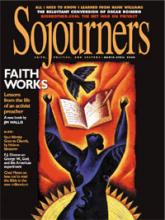TIPITAPA, Nicaragua—Cesar Augusto Mejia has given up on politicians. Decades of war, incompetence, and corruption—on the Right and Left—tends to sour a person on politics. For many Nicaraguans, it hasn’t really mattered whether the government’s acclaimed ideology was Sandinista Left or neoliberal Right, the upshot has been a hardscrabble life, little meaningful work, and less hope.
A stenciled sign next to the road from Managua to the small town of Tipitapa summed it up. "Sandinistas y Somacistas..." was scrawled at the top, followed by words that a visiting North American journalist translated as "...we’re all the same." She was asked, "Does that mean, ‘we’re all in this together’?" "I think that’s the idea," she said. Later, as we passed the sign on our way out of town, a native Spanish speaker clarified, saying the sign actually reads "they’re all the same." It’s a protest sign, he explained. It says, essentially, that they’re both screwing us; neither party cares about the poor, about the people.
Nicaragua is one of the hemisphere’s poorest countries, and demographics suggest that it will remain so: Half the population is under age 15, and a half-million children have no access to the nation’s education system. For Cesar Augusto, the main problem has been finding work in a country with a 60 percent unemployment rate.
Read the Full Article
